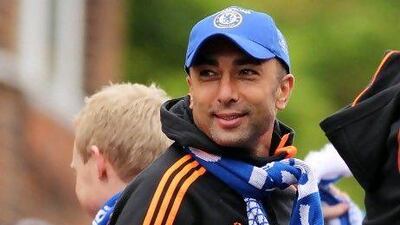As Didier Drogba wheeled away in celebration, soon to disappear under a mass of Chelsea bodies, Roberto Di Matteo's reaction was typical of a man who has retained his composure in the most trying of circumstances. He headed along the touchline to shake hands with Jupp Heynckes, the Bayern Munich manager, two dignified individuals surrounded by delirium and despair.
Block out the din at the Allianz Arena and a glance at the Italian provided no hint of the enormity of his achievements.
Chelsea were finally champions of Europe, the interim manager accomplishing something his garlanded predecessors could not.
Roman Abramovich has spent £65 million (Dh377.6m) paying off coaches in his nine-year reign at Stamford Bridge. Parting company with Di Matteo would cost him nothing financially, but would squander the goodwill gained during Chelsea's incredible Champions League run.
Di Matteo has not merely smashed the glass ceiling. He has detoxified the Chelsea brand, his likeable, understated style a welcome contrast from the unlamented, arrogant Andre Villas-Boas and his unassuming approach an antidote to the cult of the manager.
Invariably called Robbie by his players, Di Matteo seems part manager, part mate. It is a reason for his success - he has been an enabler and a facilitator, rather than a distant dictator - but so is his decision making. Because, while Di Matteo has won his players over, he has not done so simply by picking the big names in their preferred positions.
Examine the judgement calls made in the major games and it is notable how many left-field moves have been justified. Ryan Bertrand was parachuted into Saturday's side against Bayern, making his European debut as Ashley Cole's accomplice against Arjen Robben and Philipp Lahm. It was a task the rookie performed selflessly and effectively.
The choice of Ramires in that same, left midfield, role against Barcelona was still more successful. In the second leg, after John Terry's sending off, an often flaky right-back, Jose Bosingwa, was thrust into the centre of defence, where he flourished. Another Portuguese full-back, Paulo Ferreira, was the surprise selection away against Benfica and he responded responsibly. Salomon Kalou and John Obi Mikel, maligned men from the margins, have returned to assume an importance. Their recalls were not obvious choices, but few of Di Matteo's masterstrokes have been.
It has added to the unique feel of Chelsea's progress. A club with ambitions to dominate instead succeeded as outsiders. For long periods of time, they simply survived, sheer resolve keeping them in games when they saw little of the ball and still less of the opposition's goal. For all the millions Abramovich has spent, it has been a triumph of teamwork.
In overcoming a Bayern team expecting a coronation on their own ground, in defeating a Barcelona side that may be the greatest ever, even in retrieving a 3-1 deficit against Napoli, this has been a remarkable ride.
In the manner of it, it can never be repeated. The challenge for Chelsea is to prove they can conquer Europe by more orthodox means, the decision if Di Matteo, the stylish architect of great rearguard actions, can construct the sort of sides Abramovich dreamed of possessing.
He has excelled at crisis management. Short-termism has been Chelsea's default mode for years - in between devising grandiose plans for the future - but it has never been as seductive. Yet with Didier Drogba now 34 and out of contract, with Frank Lampard turning 34 next month, with Terry the most prominent of a group of others whose best days are behind them, the bigger picture remains unchanged.
Almost five years after his departure, Jose Mourinho still signed the majority of the starters in Munich. Chelsea need a long-term vision, a way of moving on from their golden generation. And yet it is equally clear that Di Matteo deserves the chance to articulate and implement his vision.
It will not be as brutal as the attempts by Villas-Boas to make a break with the past. He is too diplomatic and too intelligent for that. He is also appreciative enough of the veterans and the qualities they provide. Yet evolution, rather than revolution, is the sensible model and Di Matteo the sensible choice.
And now he has the star-studded CV Chelsea usually require. They have been blinded by the glint of silverware others possessed in the past. They have hired three Champions League-winning managers and one World Cup winner in the last decade alone. Amid hard-luck stories and near misses, none achieved what Di Matteo has.
In the build-up to the Champions League final, as his employers ignored any number of opportunities to endorse the interim manager, to recognise his success in winning the FA Cup and reviving a troubled club, Di Matteo seemed to share the amiable brand of fatalism exhibited by another Italian, Carlo Ancelotti, before his dismissal 12 months ago. His nonchalance has been a forte but Chelsea's ingratitude has been revealing.
It was Heynckes, sacked by Real Madrid after winning the Champions League in 1998, who delivered the most accurate appraisal of the job Di Matteo has done, with the Bayern manager saying his Chelsea counterpart should get a three-year contract.
And so he should.
Follow us


